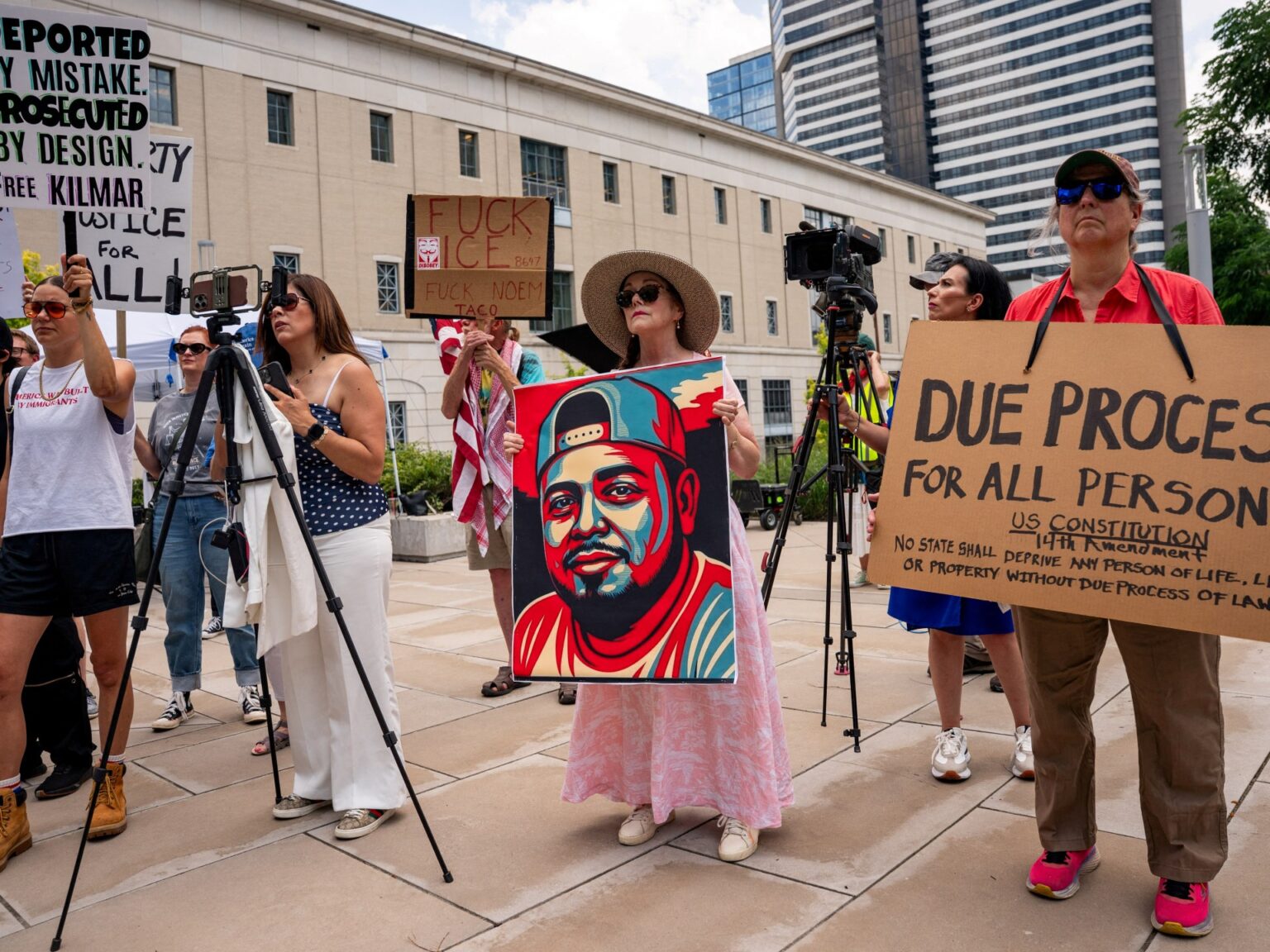A United States judge has blocked immigration authorities from immediately detaining and deporting Kilmar Abrego Garcia upon his release from jail.
The decision was part of a one-two punch on Wednesday, as two courts weighed in on the Maryland father’s fate.
Abrego Garcia was catapulted into the national spotlight in March after the administration of President Donald Trump wrongfully deported him to his native El Salvador, despite a court order protecting him from removal.
His case became emblematic of the early days of Trump’s mass deportation drive, with critics accusing the president of taking a slapdash approach that violated the due process of the law.
In recent weeks, Abrego Garcia has been held in a Tennessee prison, as the Trump administration pursues criminal charges against him.
But in one of Wednesday’s twin rulings, US District Judge Waverly Crenshaw in Nashville upheld the finding that Abrego Garcia could be released from jail, rejecting Trump administration claims that he might be a danger or a flight risk.
Crenshaw also expressed doubt about the Trump administration’s claims that Abrego Garcia is a member of the gang MS-13, citing a lack of evidence.
His decision allows Abrego Garcia to potentially be released from detention as he awaits a January trial on human smuggling charges. Still, his release has been once again delayed for a period of 30 days, at the request of Abrego Garcia’s lawyers, who fear he could be deported.
Simultaneously on Wednesday, a second court hearing was unfolding in Maryland under US District Judge Paula Xinis.
She has been hearing arguments about Abrego Garcia’s wrongful deportation to El Salvador, as part of a lawsuit filed by his wife, Jennifer Vasquez Sura.
Given that Trump officials have signalled they plan to deport Abrego Garcia if he is released, Xinis issued a ruling requiring that immigration officials to give him notice of three business days if they initiate removal proceedings.
The Trump administration, Xinis wrote, has “done little to assure the court that, absent intervention, Abrego Garcia’s due process rights will be protected”.
Xinis also ordered the government to restore the legal status that Abrego Garcia had previously been under, which allowed him to live and work in Maryland.
Abrego Garcia was deported to El Salvador in March, in violation of an immigration judge’s 2019 order barring him from being sent back to his home country.
His lawyers have maintained that Abrego Garcia fled El Salvador as a teenager to avoid gang threats.
The government acknowledged that Abrego Garcia’s removal to El Salvador had been the result of an “administrative error”.
Judge Xinis — and later the US Supreme Court — ultimately ruled that the Trump administration had a responsibility to “facilitate” his return to the US.
But the Trump administration doubled down, arguing that Abrego Garcia’s removal was lawful and painting him as a member of MS-13.
Trump even posted a picture of himself to social media holding a photo of Abrego Garcia’s knuckles, with the letters and numbers for “MS-13” digitally superimposed on each finger, next to real tattoos of a smiley face and marijuana leaf.
“He’s got MS-13 tattooed onto his knuckles,” Trump wrote, falsely, on April 18.
Judge Xinis had threatened to find the Trump administration in contempt of court for failing to adequately facilitate Abrego Garcia’s release, or provide meaningful updates. Officials had argued that they had little power to bring him back, given that he was held in El Salvador.
But in early June, the Trump administration abruptly announced Abrego Garcia’s return to the US. At the same time, the Justice Department revealed it had obtained an indictment to criminally charge Abrego Garcia.
At the centre of the government’s case is a video from a November 2022 traffic stop, showing Abrego Garcia driving a Chevrolet Suburban SUV with three rows of seats. A police officer heard in the footage speculates that the nine passengers could be involved in human smuggling, but no charges were brought at that time.
His lawyers have dismissed the government’s case as “preposterous”.
Still, before Xinis’s ruling, the lawyers had requested Abrego Garcia remain in custody as he awaits trial, for fear that he might be immediately deported if released.
While Abrego Garcia cannot be sent to El Salvador again, the Trump administration has maintained he can be legally deported to a third country, even one where he has no personal ties.
Last month, the US Supreme Court ruled that the Trump administration could, at least in the short term, continue to deport individuals to such third-party countries while legal challenges proceed against the practice.
Some of those third-party countries have included South Sudan and Eswatini, formerly known as Swaziland, both of which have faced accusations of human rights abuses in their prisons.
A spokeswoman for the Department of Homeland Security took to the social media platform X on Wednesday to criticise Xinis’s latest ruling.
“The fact this unhinged judge is trying to tell ICE [Immigration and Customs Enforcement] they can’t arrest an MS-13 gang member, indicted by a grand jury for human trafficking, and subject to immigration arrest under federal law is LAWLESS AND INSANE,” spokesperson Tricia McLaughlin wrote, reiterating unproven claims.
Abrego Garcia’s lawyers, however, applauded Wednesday’s court decisions.
“These rulings are a powerful rebuke of the government’s lawless conduct and a critical safeguard for Kilmar’s due process rights,” lawyer Simon Sandoval-Moshenberg said in a statement.
https://www.aljazeera.com/news/2025/7/23/us-court-decisions-allow-for-abrego-garcias-release-bar-his-deportation?traffic_source=rss


